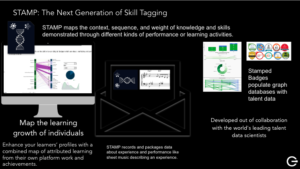Navigating the Evolving Landscape of Education Technology: CEDS, Ed-Fi, A4L, and the Quest for Interoperable Meaning
In the fast-paced world of education technology, staying ahead of emerging trends and standards is crucial to driving progress. The recent discussion at Ed3 brought together industry experts to explore the ever-evolving landscape of education technology in the United States. This meeting not only highlighted the significance of open data standards but also provided valuable insights into the trends shaping the industry’s future.
Emerging Trends in the US National EdTech Landscape
One of the prominent trends discussed during the meeting was the emergence of Artificial Intelligence (AI), particularly in the form of ChatGPT. AI’s integration into education technology promises more personalized and efficient learning experiences. However, it also raises concerns about privacy, echoing Georgetown Massive Data Institute’s emphasis on disclosure avoidance.
Another critical development is the focus on longitudinal data systems. The creation of a new R&D center by the Institute of Education Sciences (IES) underscores the importance of these systems. The shift towards longitudinal data systems represents a significant step in the quest to gather comprehensive, continuous, and meaningful data on students and workers.
The P20-W Community of Innovation was introduced as a collaborative effort involving states and solution providers. This community aims to modernize data systems and improve data governance, master data management, and data lineage. The discussion highlighted the central role of data in the journey towards student-centered learning and the utility of large-scale data systems in achieving this goal.
Additionally, cloud-native technologies and cybersecurity emerged as crucial components of the education technology landscape. The shift towards cloud-native architectures promises scalability and flexibility, while the need for robust cybersecurity measures to protect sensitive data remains paramount.
The Role of Standards: CEDS, Ed-Fi, and A4L
To navigate the complex world of education technology, it’s essential to understand the standards that underpin the industry. Common Education Data Standards (CEDS), Ed-Fi, and Access 4 Learning (A4L) are three pivotal standards organizations with unique roles and objectives.
CEDS focuses on providing a data dictionary and tools for data alignment and generation. Its Data Warehouse (CEDS DW) plays a crucial role in organizing and standardizing education data. In contrast, Ed-Fi emphasizes district-level and classroom-level data with a focus on API, Operational Data Store (ODS), and Data Warehouse (DW) technologies.
A4L brings privacy and data contract information to the forefront, ensuring that data in motion is handled securely. It plays a pivotal role in facilitating the exchange of data between different systems and standards, such as Ed-Fi or transcripts.
While these organizations have distinct projects and areas of expertise, the meeting raised the question of whether multiple standards are necessary. Vendors’ responsiveness to the needs of clients and states was discussed, suggesting the need for a more cohesive approach to standards in the future.
The Future of Education Technology: A Glimpse into the Next Five Years
Peering into the future, the discussion revolved around the expected state of education technology standards in five years. As technology continues to evolve, the education sector anticipates more seamless integration of AI-driven solutions, enhanced privacy measures, and the widespread adoption of longitudinal data systems.
However, a unified approach to standards is likely to emerge. The need for cohesion and compatibility between different standards is evident, as education technology seeks to provide more holistic and meaningful data.
The CEDS Open Source Community: Collaboration and Resources
One highlight of the meeting was the introduction of the CEDS Open Source Community (OSC). This community actively contributes to the development and enhancement of CEDS through its GitHub Repository and monthly meetings.
Collaboration and knowledge sharing within the CEDS OSC are expected to drive innovation and the creation of valuable resources. The community’s commitment to open standards aligns with the broader goal of creating interoperable meaning in education technology.
In conclusion, the Ed3 meeting shed light on the dynamic and evolving landscape of education technology in the United States. The industry’s future will be shaped by trends such as AI integration, privacy enhancement, longitudinal data systems, and standardization efforts. Organizations like CEDS, Ed-Fi, and A4L play pivotal roles in this journey towards interoperable meaning, ensuring that data remains a powerful tool for informed decision-making in education. The collaborative spirit of the CEDS Open Source Community underscores the importance of community-driven innovation and the pursuit of meaningful data standards. As the education technology landscape continues to evolve, staying informed and engaged with these standards will be essential for all stakeholders in the sector.
Navigating the Evolving Landscape of Education Technology: CEDS, Ed-Fi, A4L, and the Quest for Interoperable Meaning
In the fast-paced world of education technology, staying ahead of emerging trends and standards is crucial to driving progress. The recent discussion at Ed3 brought together industry experts to explore the ever-evolving landscape of education technology in the United States. This meeting not only highlighted the significance of open data standards but also provided valuable insights into the trends shaping the industry’s future.
Emerging Trends in the US National EdTech Landscape
One of the prominent trends discussed during the meeting was the emergence of Artificial Intelligence (AI), particularly in the form of ChatGPT. AI’s integration into education technology promises more personalized and efficient learning experiences. However, it also raises concerns about privacy, echoing Georgetown Massive Data Institute’s emphasis on disclosure avoidance.
Another critical development is the focus on longitudinal data systems. The creation of a new R&D center by the Institute of Education Sciences (IES) underscores the importance of these systems. The shift towards longitudinal data systems represents a significant step in the quest to gather comprehensive, continuous, and meaningful data on students and workers.
The P20-W Community of Innovation was introduced as a collaborative effort involving states and solution providers. This community aims to modernize data systems and improve data governance, master data management, and data lineage. The discussion highlighted the central role of data in the journey towards student-centered learning and the utility of large-scale data systems in achieving this goal.
Additionally, cloud-native technologies and cybersecurity emerged as crucial components of the education technology landscape. The shift towards cloud-native architectures promises scalability and flexibility, while the need for robust cybersecurity measures to protect sensitive data remains paramount.
The Role of Standards: CEDS, Ed-Fi, and A4L
To navigate the complex world of education technology, it’s essential to understand the standards that underpin the industry. Common Education Data Standards (CEDS), Ed-Fi, and Access 4 Learning (A4L) are three pivotal standards organizations with unique roles and objectives.
CEDS focuses on providing a data dictionary and tools for data alignment and generation. Its Data Warehouse (CEDS DW) plays a crucial role in organizing and standardizing education data. In contrast, Ed-Fi emphasizes district-level and classroom-level data with a focus on API, Operational Data Store (ODS), and Data Warehouse (DW) technologies.
A4L brings privacy and data contract information to the forefront, ensuring that data in motion is handled securely. It plays a pivotal role in facilitating the exchange of data between different systems and standards, such as Ed-Fi or transcripts.
While these organizations have distinct projects and areas of expertise, the meeting raised the question of whether multiple standards are necessary. Vendors’ responsiveness to the needs of clients and states was discussed, suggesting the need for a more cohesive approach to standards in the future.
The Future of Education Technology: A Glimpse into the Next Five Years
Peering into the future, the discussion revolved around the expected state of education technology standards in five years. As technology continues to evolve, the education sector anticipates more seamless integration of AI-driven solutions, enhanced privacy measures, and the widespread adoption of longitudinal data systems.
However, a unified approach to standards is likely to emerge. The need for cohesion and compatibility between different standards is evident, as education technology seeks to provide more holistic and meaningful data.
The CEDS Open Source Community: Collaboration and Resources
One highlight of the meeting was the introduction of the CEDS Open Source Community (OSC). This community actively contributes to the development and enhancement of CEDS through its GitHub Repository and monthly meetings.
Collaboration and knowledge sharing within the CEDS OSC are expected to drive innovation and the creation of valuable resources. The community’s commitment to open standards aligns with the broader goal of creating interoperable meaning in education technology.
In conclusion, the Ed3 meeting shed light on the dynamic and evolving landscape of education technology in the United States. The industry’s future will be shaped by trends such as AI integration, privacy enhancement, longitudinal data systems, and standardization efforts. Organizations like CEDS, Ed-Fi, and A4L play pivotal roles in this journey towards interoperable meaning, ensuring that data remains a powerful tool for informed decision-making in education. The collaborative spirit of the CEDS Open Source Community underscores the importance of community-driven innovation and the pursuit of meaningful data standards. As the education technology landscape continues to evolve, staying informed and engaged with these standards will be essential for all stakeholders in the sector.





